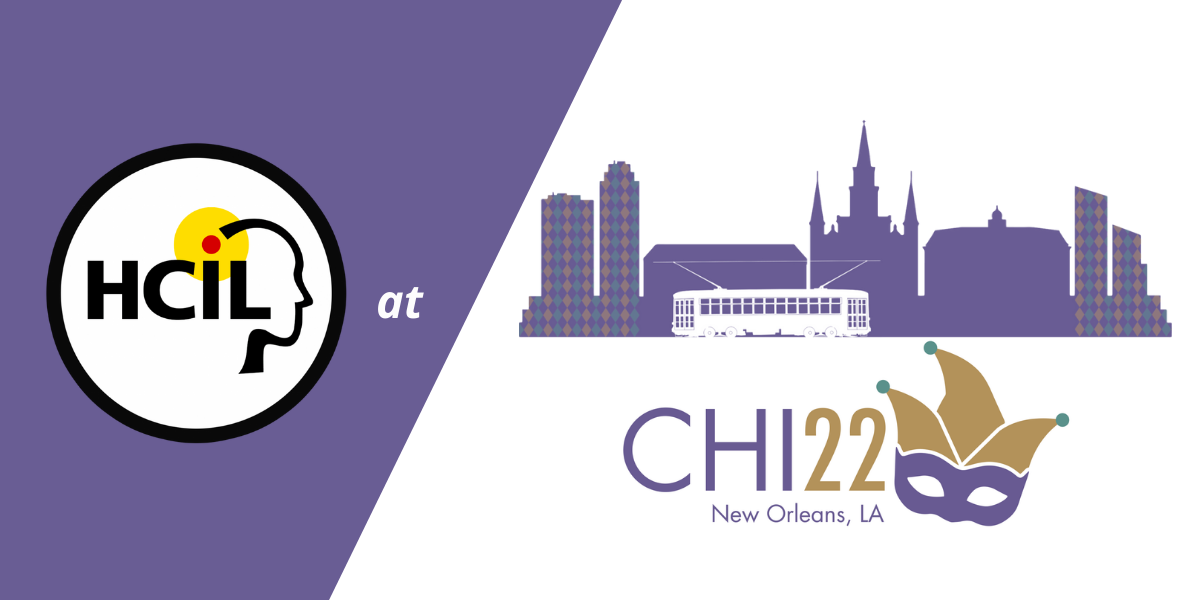23 members of the Human-Computer Interaction Lab will present their research at prestigious HCI conference.

Twenty-three faculty, staff, and students from UMD’s Human-Computer Interaction Lab (HCIL) will present their research at CHI 2022 being held from April 30-May 5, 2022 in New Orleans, LA. CHI annually brings together researchers and practitioners from all over the world and from diverse cultures, backgrounds, and positionalities, who have as an overarching goal to make the world a better place with interactive digital technologies.
At this year’s conference, structured as a hybrid-onsite conference, nine papers and one late-breaking work, two workshops, three panels, and one Special Interest Group (SIG) will feature HCIL faculty and staff. An honorable mention, which is only given to the top 2-5% of all papers accepted, was awarded to HCIL faculty, Dr. John Dickerson, and his student, Samuel Dooley, who co-authored “Field Evidence of the Effects of Pro-sociality and Transparency on COVID-19 App Attractiveness.” The paper presents the first field study of COVID-19 contact tracing apps with a randomized, control trial of 14 different advertisements for CovidDefense, Louisiana’s COVID-19 exposure-notification app.
Additional topics to be covered in these sessions hosted by members of the HCIL will include research on visual analytics and mixed reality, technologies for aging, and grand challenges for personal informatics and AI. Dr. Jessica Vitak, Director of the HCIL, will also be featured at a SIG discussion on research ethics in HCI.
“We are proud of the research contributions lab members have made at CHI conferences, and this year is no different, with HCIL members on 10 papers that will be presented at the conference, as well as workshops, panels, and a SIG. 2022 will also be special because it’s the first in-person CHI since 2019, and for many students, this will be the first CHI they attend,” Vitak remarked.
The HCIL at UMD launched a year after the first CHI conference in 1982, and in the many years since, CHI has remained one of the most important venues for HCIL students and faculty to share their work. The CHI conference series started with the Human Factors in Computer Systems conference in Gaithersburg, Maryland, US in 1982, organized by Bill Curtis and Ben Shneiderman, who is the founder of the HCIL at UMD.
Check out the full list of accepted works by HCIL faculty and staff and their respective conference session links below:
PAPERS
MyMove: Facilitating Older Adults to Collect In-Situ Activity Labels on a Smartwatch with Speech
Authors: Young-Ho Kim, Diana Chou, Bongshin Lee, Margaret Danilovich, Amanda Lazar, David E. Conroy, Hernisa Kacorri, Eun Kyoung Choe
ReLive: Bridging In-Situ and Ex-Situ Visual Analytics for Analyzing Mixed Reality User Studies
Authors: Sebastian Hubenschmid, Daniel Fink, Johannes Zagermann, Andrea Batch, Niklas Elmqvist, Harald Reiterer
Field Evidence of the Effects of Pro-sociality and Transparency on COVID-19 App Attractiveness [Honorable Mention]
Authors: Samuel Dooley, Dana Turjeman, John Dickerson, Elissa Redmiles
Scaling Creative Inspiration with Fine-Grained Functional Facets of Product Ideas
Authors: Tom Hope, Ronen Tamari, Hyeonsu Kang, Daniel Hershcovich, Joel Chan, Aniket Kittur, Dafna Shahaf
Barriers to Online Dementia Information and Mitigation
Authors: Emma Dixon, Jesse Anderson, Diana C Blackwelder, Mary L Radnofsky, Amanda Lazar
FAR: End-to-End Vibrotactile Distributed System Designed to Facilitate Affect Regulation in Children Diagnosed with Autism Spectrum Disorder Through Slow Breathing
Authors: Pardis Miri, Mehul Arora, Aman Malhotra, Robert Flory, Stephanie Hu, Ashley Lowber, Ishan Goyal, Jacqueline Nguyen, John P Hegarty, Marlo Kohn, David Schneider, Heather Culbertson, Daniel LK Yamins, Lawrence Fung, Antonio Hardan, James J Gross, Keith Marzullo
TalkTive: A Conversational Agent Using Backchannels to Engage Older Adults in Neurocognitive Disorders Screening
Authors: Zijian Ding, Jiawen Kang, Tinky Oi Ting HO, Ka Ho Wong, Helene H Fung, Helen Meng, Xiaojuan Ma
Adopting Diffractive Reading to Advance HCI Research: A Case Study on Technology for Aging
Authors: Amanda Lazar, Ben Jelen, Alisha Pradhan, Katie A Siek
PLIERS: A Process that Integrates User-Centered Methods into Programming Language Design
Authors: Michael Coblenz, Gauri Kambhatla, Paulette Koronkevich, Jenna L Wise, Celeste Barnaby, Joshua Sunshine, Jonathan Aldrich, Brad A Myers
Investigating the Potential of Artificial Intelligence Powered Interfaces to Support Different Types of Memory for People with Dementia (LATE BREAKING WORK)
Authors: Hanuma Teja Maddali, Emma Dixon, Alisha Pradhan, Amanda Lazar
WORKSHOPS
Grand Challenges for Personal Informatics and AI
Organizing team includes HCIL’s Eun Kyoung Choe
Human-centered Explainable AI (HCXAI): Beyond Opening the Black-Box of AI
Organizing team includes HCIL’s Hal Daumé III
PANELS
Fabricate It or Render It? Digital Fabrication vs. Virtual Reality for Creating Objects Instantly
Featuring HCIL’s Huaishu Peng
Alexa, Tell Me a Joke!: “Voice Interfaces are Truly Inclusive”
Featuring HCIL’s Amanda Lazar
Telelife: A Vision of Remote Living in 2035
Featuring HCIL’s Huaishu Peng
SIG (Special Interest Group)
Research Ethics in HCI: A SIGCHI Community Discussion
Featuring HCIL’s Jessica Vitak
Original list was announced by the HCIL here.
- Awards & Rankings
- Events
- Faculty & Staff
- INFO News
- Partner & Industry News
- Research News
- Accessibility and Inclusive Design
- Machine Learning, AI, Computational Linguistics, and Information Retrieval
- Data Science, Analytics, and Visualization
- Digital Humanities
- Future of Work
- Health Informatics
- Human-Computer Interaction
- Information Justice, Human Rights, and Technology Ethics
- Youth Experience, Learning, and Digital Practices
- Human-Computer Interaction Lab (HCIL)